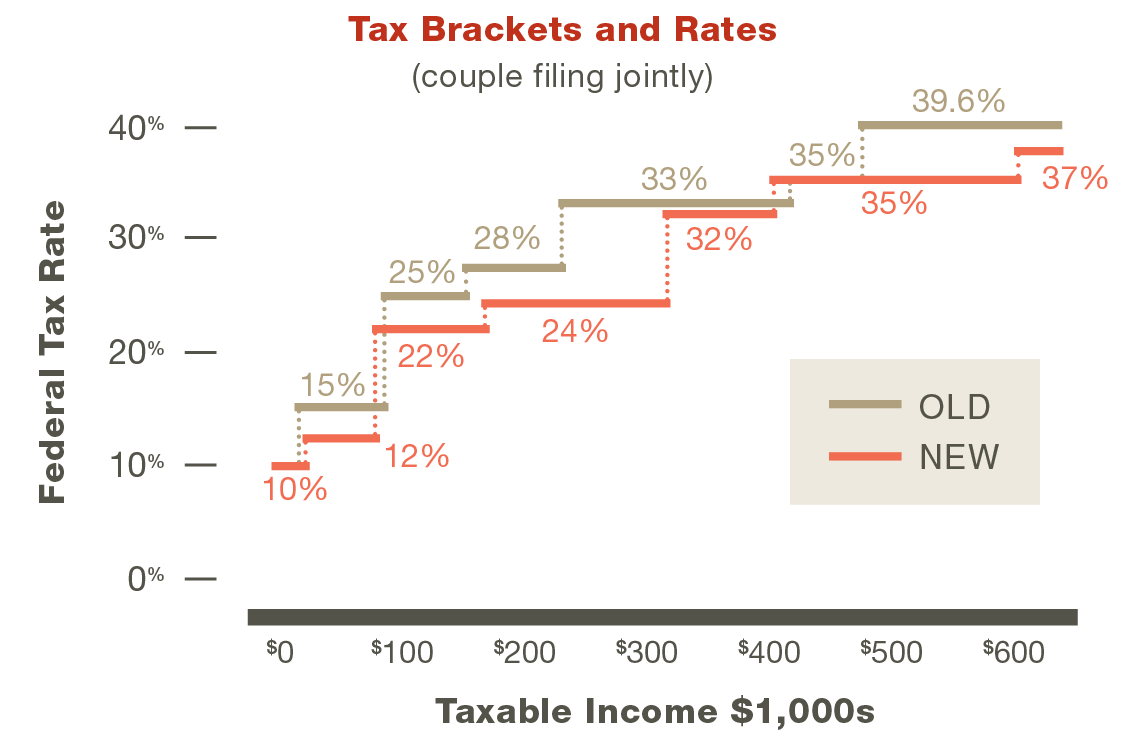The Tax Cuts and Jobs Act passed in 2017 introduced changes and opportunities for agricultural operations. We are not tax experts and would never recommend you manage your operation based solely on taxes. But as a financial partner, we want to help you reach decisions that assure your business is structured and operating in the best possible way. We asked Paul Neiffer, CPA with CliftonLarsonAllen LLP, to help us identify key tax reforms that might impact you.
Note that many of the changes are not permanent in the law, so you need to talk to your advisor about how current timelines affect the decisions you make today.
Tax Rates and Deductions
Individual rates have been reduced and top out at a lower
amount than in the past, as illustrated in the graph below.

Deduction of personal state and local income, sales and real
estate taxes is limited to $10,000 on personal tax returns. This
limitation does not apply to C corporations.
The standard deduction increased to $12,000 (individual) and
$24,000 (married couples filing jointly).
The child tax credit doubled to $2,000.
Ask your tax advisor:
- What is the optimum tax bracket for my operation?
- What tax brackets have the biggest reduction in tax rate?
- What does it mean that federal income taxes are
“progressive?”
- What is the optimum tax bracket for my operation?
- Should I pay wages to my kids for work performed on
the farm?
- Should I make commodity gifts to my kids or grandkids?
Business Structure
The top corporate tax rate is a flat 21 percent. This rate may be an increase for some producers, whose effective corporate tax rate may have been 15 percent. Their overall tax may be lower, however, based on other new deductions.
Ask your tax advisor:
- What business structure is right for my operation?
- Should I consider incorporating my farm operation?
- If I incorporate, should I be a C or an S corporation?
- Will a C corporation allow me to deduct my state income taxes if they exceed the $10,000 cap?
- Should I operate as a sole proprietor or set my business up as a manager of a managed LLC to reduce self-employment taxes and maximize the Section 199A deduction?
Asset Depreciation
New and used farm assets (other than land) can now be fully depreciated in the year of purchase using 100 percent bonus depreciation. This includes improvements. So if a farmer purchases a farm with buildings, wells and fences, those features are now 100 percent deductible at the time of purchase.
Section 179 is available up to $1 million.
Ask your tax advisor:
- How fast should I depreciate assets?
- Does my strategy change if I am financing the purchase of
the assets?
- Does my state allow bonus depreciation or Section 179 on
my purchases?
- What happens if I purchase farm assets from a related party?
- Should I consider leasing my equipment under the new
tax laws?
Selling and Trading Farm Equipment, Land, Etc.
Section 1031 tax-deferred exchanges are allowed only for real property – land and buildings. Previously, if a farmer traded a fully-depreciated $40,000 tractor for a $100,000 tractor, the new tractor’s depreciation basis would be the difference, or $60,000. Now, in that same scenario, you have to claim $40,000 of income and then fully expense the $100,000 tractor through bonus depreciation, or Section 179.
Ask your tax advisor:
- Is it better to sell or trade my farm equipment?
- How does my state treat the trade-in of farm equipment?
- What is the tax effect of trading land with or without improvements?
Net Operating Losses
There is a $500,000 limit on net business losses. Up to $500,000 of farm business losses can be carried back a maximum of two years or the loss can be carried forward. Losses can be carried forward an unlimited number of years, unlike previous law that limited carryforward to 20 years. Non-farm losses can only be carried forward. Losses can only offset 80 percent of taxable income on carryback or carryforward. Finally, losses do not reduce self-employment income tax.
Ask your tax advisor:
- Are there changes to how net operating losses are handled?
- Is it better to report some income to maximize the use of the standard deduction and child tax credits?
- How do net operating losses affect my self-employment income?
Fringe Benefits
Meals provided to employees are now only 50 percent deductible but remain tax-free for employees and 100 percent deductible for owners of a C corporation. After 2025, there is no deduction for meals.
C corporation employers are still permitted to deduct the value of lodging provided to employees. It remains a tax-free benefit to the employee of a C corporation.
Health insurance for S corporation owners and partners remains deductible.
Ask your tax advisor:
- What happens to fringe benefits, such as health insurance, meals and employee lodging?
- Should I incorporate to provide tax-free fringe benefits for housing and meals to me as an owner?
- What are the details needed to provide for these tax-free fringe benefits?
- If the meals deduction is eliminated in 2026, is it worth doing?
Estate Taxes
Ask your tax advisor:
- How could estate taxes affect my operation? Under what circumstances?
- Should I make major gifts between now and 2025, when the rules are scheduled to change again?
- Does my state have an estate tax, and if so, does it exempt farm property?
- Should I transfer my farm assets into an entity to allow for tax reductions?
There are many more questions to ask – and they will vary given your circumstances – but these should help get you started.
Check with your FCSAmerica financial officer to learn about the wide range of finance and lease options that fit the needs of your operation.

